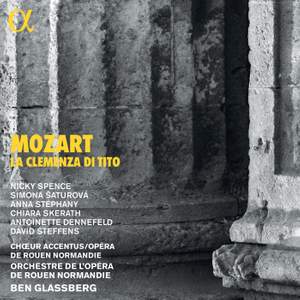
Wolfgang Amadeus Mozart (1756-1791)
La Clemenza di Tito, Opera seria in two acts (1791)
Tito – Nicky Spence (tenor)
Vitellia – Simona Šaturová (soprano)
Sesto – Anna Stéphany (mezzo)
Servilia – Chiara Skerath (soprano)
Annio – Antoinette Dennefeld (soprano)
Publio – David Steffens (bass)
Choeur Accentus/Opéra de Rouen Normandie
Orchestre de l’ Opéra de Rouen Normandie/Ben Glassberg
rec. 2020, Opéra de Rouen Normandie, France
ALPHA CLASSICS 793 [2 CDs: 113]
Recordings of La Clemenza di Tito don’t come around very often, so we need to grab them with both hands when they do. It’s probably still Mozart’s least popular mature opera, but the days when it was dismissed out of hand as second-tier royal propaganda are long gone, and anyone with ears to hear can sense a top composer operating at the peak of his powers.
This recording serves the opera very well indeed. The Rouen Opera Company hadn’t really crossed my radar much prior to this, but their orchestra and chorus (helped out by Accentus) do a splendid job here, directed with dramatic vigour by their Music Director, British conductor Ben Glassberg. The orchestra uses modern instruments, but with lots of period touches: there’s a particular thwack to the timps and rasp to the trumpets that suggest older instruments there, and Glassberg’s tempi are consistently taut and driven. That makes the big ceremonial scenes very exciting, disarmingly so in the final scene, which is much faster than I’ve heard played before. However, I loved the final bars of tutti splendour which bring the curtain down with a crackle of energy that no other recording manages. There’s a lightness of touch to the whole orchestral palette that is consistently invigorating, and the clarinet/basset horn obligati in Sesto’s and Vitellia’s big arias sound great. The chorus sound a little too stately at times, and their contributions to the final scenes of both acts sound a little ceremonial, but this never gets too badly in the way.
The solo singing is mostly very good, too, led by a terrific performance from Nicky Spence as the Emperor. He’s a revelation here, unmasking new colours to his voice that few have had cause to suspect were there before. Gone is the gung-ho boyishness that has been the default in a lot of his recorded song cycles: he summons up a whole new level of gravitas and dignity to play this Roman Emperor, so much so that I wouldn’t have guessed it was him unless the booklet had told me so. With that comes deeper dramatic insights, too: his accompagnato before his judgement of Sesto is genuinely searching, suggesting a depth to the character that previously I’d only heard from Philip Langridge in Harnoncourt’s recording. True, his coloratura still has a little way to go in Se all’impero, but this marks a new chapter in his development as an artist and confirms him as one of our greats.
The ladies are all very good individually, too. After Spence, the set’s standout is Anna Stéphany terrific Sesto. She uses every part of her voice to engender sympathy for this torn hero, and sounds wonderfully moving in Sesto’s two big arias, which are highlights of each act. Simona Šaturová’s vampish Vitellia makes it clear why she has all these men wrapped around her little finger. She uses the voice’s sensuality with great flair to underline the character’s political use of her sexuality, and it’s never in doubt that Sesto is totally in thrall to her.
In the lesser roles, Antoinette Dennefeld is a little shrill as Annio, but Chiara Skerath’s Servilia is sweet and endearing. David Steffens does all that he can with the thankless part of Publio.
If there’s a criticism then it’s that the female voices often sound rather similar, making it difficult to distinguish one character from another in the ensembles, particularly those in Act 1. That doesn’t diminish an overall impressive achievement, though. Alpha’s recorded sound is terrific, too, and lets the whole thing breathe with theatrical flair. It has the perfection of a studio recording, though they don’t specify anywhere that that’s what it is. However, there’s plenty of drama to keep the listener involved, so it never feels studio-bound.
If you’re looking for a modern recording of the opera then this will do very nicely indeed, though for me it doesn’t quite surpass Sir Charles Mackerras’ recording with the Scottish Chamber Orchestra, which achieves a similar period/modern blend in the orchestral sound, though it’s let down by an uninteresting Tito. Hogwood’s recording on period instruments will always have a special position for Cecilia Bartoli’s Sesto and for being (I think) the first recording to show us how wonderful a basset horn can sound in Non più di fiori. Harnoncourt’s sports an excellent Philip Langridge but less interesting ladies, and falls prey to some of his trademark tempo waywardness at times. The most dramatically involving Tito you’ll hear, however, is still Sir Colin Davis’ 1976 recording from Covent Garden with the untouchable team of Janet Baker’s Vitellia, Yvonne Minto’s Sesto and Stuart Burrows’ Tito. More than four decades later, that’s still the one to beat.
There’s one black mark connected to Alpha’s packaging, though. The booklet contains a synopsis and brief essay, but you get the full Italian text and translations in French and English. However, it’s cumbersomely glued into the CD box in a way that makes it almost impossible to read it comfortably while sitting in a chair and listening to the discs. I admit that this is a pet hate of mine, but come off it, all you record labels! There are few enough incentives to purchase a physical product these days: don’t disincentivise it for us even more. The whole point of a booklet is for it to be read, so don’t make that harder for us than it needs to be.
Simon Thompson
Help us financially by purchasing from





















